 Global| Jun 24 2005
Global| Jun 24 2005U.S. Durable Goods Orders Soar
by:Tom Moeller
|in:Economy in Brief
Summary
New orders for durable goods soared 5.5% in May, lifted by aircraft & parts orders which more than doubled m/m. Consensus expectations had been for a 1.5% rise. The 125% surge in orders for aircraft raised transportation equipment [...]
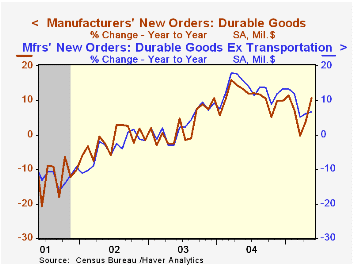
New orders for durable goods soared 5.5% in May, lifted by aircraft & parts orders which more than doubled m/m. Consensus expectations had been for a 1.5% rise.
The 125% surge in orders for aircraft raised transportation equipment orders by 21.2%. A 0.2% (-1.6%) gain in motor vehicles & parts also contributed.
Less transportation durable orders fell 0.2% (+6.6% y/y) for the third slight decline in the last four months. Computer & electronic equipment orders fell 1.2% (+5.2% y/y), the second consecutive monthly decline, and machinery orders fell 1.9% (+8.7% y/y). Electrical equipment orders rose 0.3% (4.2% y/y) and "other" orders rose 1.8% (6.3% y/y).
Orders for non-defense capital goods rose 14.5% on the strength of the orders received by Boeing. Less aircraft capital goods orders fell 2.3% and shipments rose just 0.2% (12.2% y/y). During the last four months shipments have fallen 1.1%.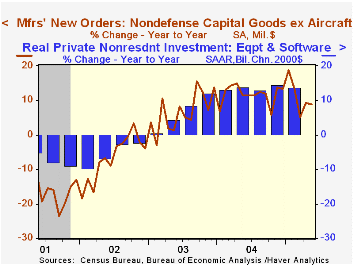
Durable inventories rose 0.3% (8.7% y/y) following no change in April. Less transportation inventories also rose 0.3% (9.8% y/y).
Unfilled orders jumped 1.9% (7.6% y/y) but outside of the transportation sector backlogs fell slightly (+7.7% y/y). The ratio of backlogs to shipments outside of transportation has been moving erratically sideways since early last year.
How Long Is Long Term Investment? from the Federal Reserve Bank of Kansas City is available here.
| NAICS Classification | May | April | Y/Y | 2004 | 2003 | 2002 |
|---|---|---|---|---|---|---|
| Durable Goods Orders | 5.5% | 1.4% | 10.7% | 10.8% | 2.6% | -1.7% |
| Excluding Transportation | -0.2% | -0.7% | 6.6% | 13.1% | 3.2% | -4.2% |
| Nondefense Capital Goods | 14.5% | 4.0% | 28.2% | 13.7% | 5.6% | -7.2% |
| Excluding Aircraft | -2.3% | 1.7% | 8.9% | 11.7% | 6.6% | -7.1% |
by Tom Moeller June 24, 2005
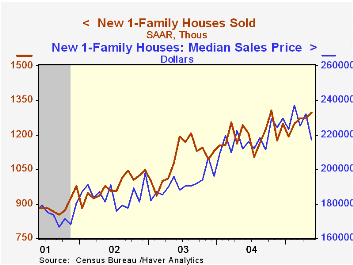
New single-family home sales in May rose 2.1% m/m to 1.298M. The figure was slightly below the record level reached last October but sales during prior months were revised lower. Consensus estimates had been for sales of 1.32M.
Sales in the Northeast in May gave back all of the prior month's spurt (-28.2% y/y) and sales in the South fell 0.8% (+3.8% y/y), down for the fourth month this year. Sales in the Midwest rose 22.9% (28.2% y/y) to a record high and sales out West rose 1.7% (0.8% y/y).
The median price of a new single family home fell 6.5% to $217,000 (+2.5% y/y), the lowest level since last September.
The figures from the Census Department reflect homes sold.
| Homes Sales (000s, AR) | May | April | Y/Y | 2004 | 2003 | 2002 |
|---|---|---|---|---|---|---|
| New Single-Family | 1,298 | 1,271 | 4.4% | 1,200 | 1,091 | 976 |
by Carol Stone June 24, 2005
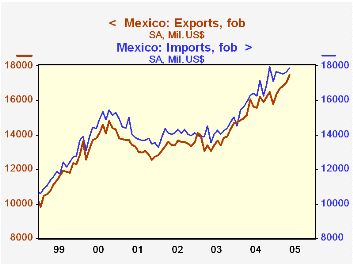
Are you aware that Mexico runs a trade deficit? In May, this was $434.6 million; in 2004, it averaged $726.7 million a month. Over the past year, exports, not seasonally adjusted, have grown 13.3%; while higher petroleum exports are part of this growth, nonpetroleum exports have risen 12.4%.
So Mexico is yet another instance in which conventional wisdom would suggest that a specific nation must surely have a huge trade surplus: don't "we" import a lot from Mexico, as "we" do from China and India? But contrary to popular belief, those are both countries which have near balances in their trade accounts, not big surpluses.
Mexico does run a substantial surplus with the US, recently around $5 billion monthly. US purchases account for about 87% of Mexican exports, a substantial part of which involves the "maquiladora" trade, the plants near the US border which import parts and components for products that they assemble and re-export.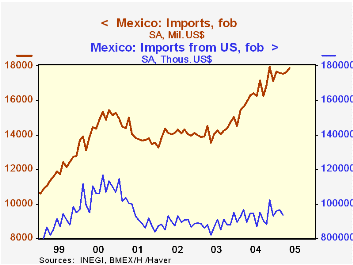
While the shares of Mexican trade connected to the US and/or to the maquiladora operations are large, Mexico does engage other countries and purposes. Particularly in the past couple of years, Mexican imports from non-US countries have grown rapidly: In March (the latest available), they were $8.2 billion, almost half of that month's total goods imports. In 2002, these imports averaged just $5.1 billion monthly, 36.5% of imports. In the more recent periods, Brazil, China and the EU have accounted for notable parts of the Mexico's import business. Further, consumer goods imports have been expanding. Over the last 12 months, they have grown by 17.4%, compared with an increase of 14.3% for total imports. Capital goods imports have also strengthened. These upturns coincide with the run-up in oil prices and the consequent surge in Mexico's petroleum exports. Quite possibly, these additional oil revenues are being recycled into the world economy, perhaps into countries other than the ones who bought the oil.
| MexicoSeas Adj, Mil.$ | May 2005 | Apr 2005 | Mar 2005 | Monthly Averages|||
|---|---|---|---|---|---|---|
| 2004 | 2003 | 2002 | ||||
| Trade Balance | -434.6 | -587.9 | -734.2 | -726.7 | -475.0 | -627.6 |
| Exports | 17476.7 | 17039.4 | 16836.7 | 15620.2 | 13738.0 | 13407.1 |
| To US | -- | -- | 14690.7 | 13732.8 | 12046.1 | 11846.0 |
| All Other | -- | -- | 2146.0 | 1897.4 | 1691.9 | 1561.1 |
| Imports | 17896.2 | 17651.6 | 17574.0 | 16318.1 | 14213.8 | 14040.5 |
| From US | -- | -- | 9354.7 | 9272.0 | 8810.3 | 8910.2 |
| All Other | -- | -- | 8219.3 | 7046.1 | 5403.5 | 5130.3 |
Tom Moeller
AuthorMore in Author Profile »Prior to joining Haver Analytics in 2000, Mr. Moeller worked as the Economist at Chancellor Capital Management from 1985 to 1999. There, he developed comprehensive economic forecasts and interpreted economic data for equity and fixed income portfolio managers. Also at Chancellor, Mr. Moeller worked as an equity analyst and was responsible for researching and rating companies in the economically sensitive automobile and housing industries for investment in Chancellor’s equity portfolio. Prior to joining Chancellor, Mr. Moeller was an Economist at Citibank from 1979 to 1984. He also analyzed pricing behavior in the metals industry for the Council on Wage and Price Stability in Washington, D.C. In 1999, Mr. Moeller received the award for most accurate forecast from the Forecasters' Club of New York. From 1990 to 1992 he was President of the New York Association for Business Economists. Mr. Moeller earned an M.B.A. in Finance from Fordham University, where he graduated in 1987. He holds a Bachelor of Arts in Economics from George Washington University.
More Economy in Brief
 Global| Feb 05 2026
Global| Feb 05 2026Charts of the Week: Balanced Policy, Resilient Data and AI Narratives
by:Andrew Cates






